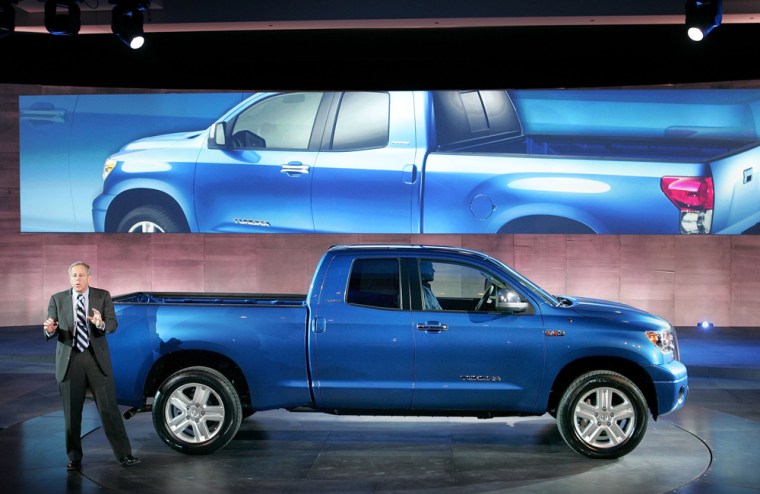Toyota Motor Corp. unveiled a revamped version of its Tundra pickup Thursday, as the Japanese automaker looks to make headway in U.S. territory where consumers have been stubbornly opposed to buying foreign vehicles.
The restyled Tundra represents Toyota’s third attempt to inch into the full-size truck market -- a category dominated by Ford Motor Co., General Motors Corp. and Dodge, a unit of DaimlerChrysler.
Together, the Big Three sell more than nine out of every 10 trucks in the full-size space, according to research firm J.D. Power and Associates, and those sales represent a big chunk of profits.
“It’s an important vehicle,” said Matt Vicenzi, a J.D. Power analyst.
Jim Press, the head of Toyota Motor Sales USA Inc. agreed. At Thursday’s world premier of the new Tundra at the Chicago Auto Show, he said the new truck represented “the most important product announcement we’ve ever had.”
Toyota’s first two runs at the full-size pickup space --the T-100 and the first generation Tundra -- failed to generate the excitement or sales that Toyota hoped, in part, because of perceptions they were smaller and underpowered compared to U.S. peers.
What’s more, many blue-collar truck owners remain loyal to American brands and eschew foreign ones.
But Toyota’s unwillingness to give up has caused a lot of anxiety in Detroit, where the automaker’s tenacity has paid off in other vehicle segments. Since truck sales are likely to hold at current levels, according to J.D. Power estimates, the segment is becoming a zero sum game.
“It’s a concern,” said J.D. Power’s Vicenzi. “I wouldn’t say it keeps the Big Three awake at night. But it’s a concern. They tend to be very profitable vehicles.”
In an effort to get it right this time, Toyota did more than just add more “power, pull and payload” to the existing Tundra, Press at Toyota USA said.
It sent designers and engineers into the field to drive trucks for long periods or to live alongside people who drove them for a living.
The result, rolled out Thursday to a rock-and-roll soundtrack that was part ZZ Top, part George Thoroughgood, looks like the old Tundra, but is 10 inches longer and features a larger cargo bed. Toyota will offer the revamped Tundra with three different engines; it will have the capability of towing more than 10,000 pounds.
Press called the new Tundra a “big, bad mutha of a truck.”
The Tundra isn’t the only model Toyota plans to introduce in 2006. Earlier this week, it unveiled the new Lexus ES 350, which will replace its ES 330 entry-level mid-size luxury car. This spring, the company will begin selling the Yaris, which replaces the entry-level Echo. And sometime in the second half of the year, Toyota will begin selling a hybrid version of its Camry.
Body blows
Given the disproportionate role that full-size truck sales play in automakers’ bottom lines, the success of the Tundra --and Nissan Motor Co.’s Titan full-size pickup -- would represent another blow to Detroit.
For Toyota, the Tundra represents a big bet -- but not a make-or-break wager. The company is confining production to one facility in Indiana, with ramp-up capacity -- if it’s needed --from another plant in Texas.
“The stakes are high but not that high,” said Jim Hall, vice president for industry analysis at AutoPacific, an automotive research firm in Southfield, Michigan, adding that ”they won’t have excess capacity issues.”
Anne Stevens, chief operating officer for Ford’s Americas division, which has dominated the market with its F-Series trucks for three decades, insists her company isn’t afraid of the competition.
“I’m not worried,” Stevens told reporters Wednesday at the show. “We sold 901,000 units last year. We have customers who love that truck ... we have truck leadership and we intend to stay as leaders.”
